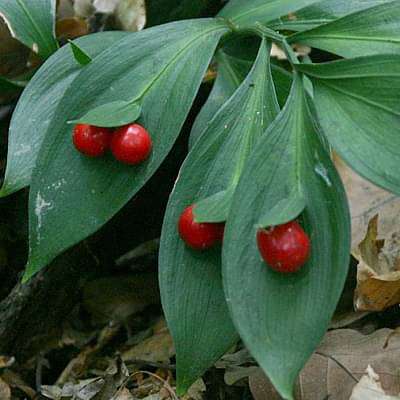
Ruscus hypoglossum - Plant
(MRP Inclusive of all taxes)
- Shipping ₹79 for entire order
- Dispatch in 7 days
- Country of origin: India

(MRP Inclusive of all taxes)
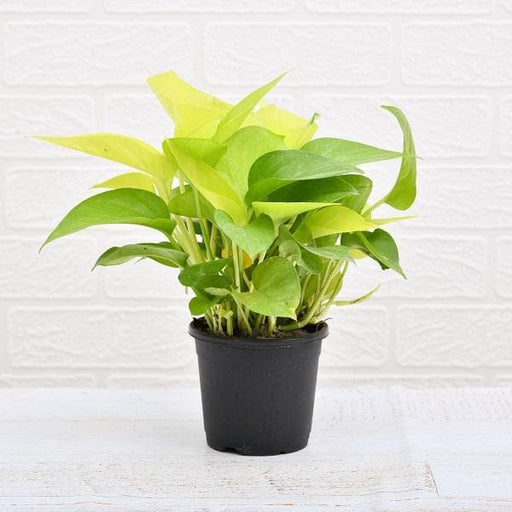 Save 29%
Save 29%
Air Purifier Money Plant with Pot The Air Purifier Money Plant, also known as Pothos or Epipremnum aureum, is a stunning indoor plant that...
View full details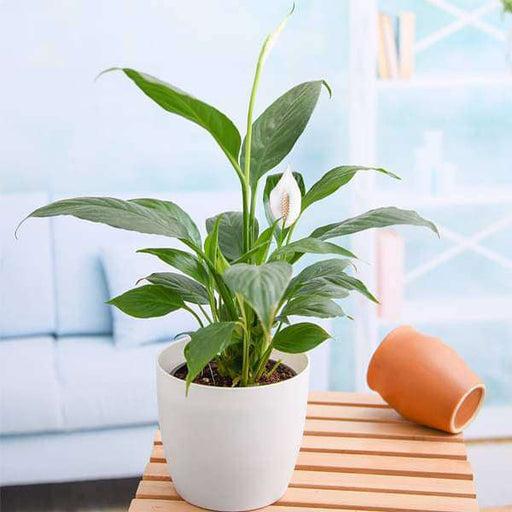
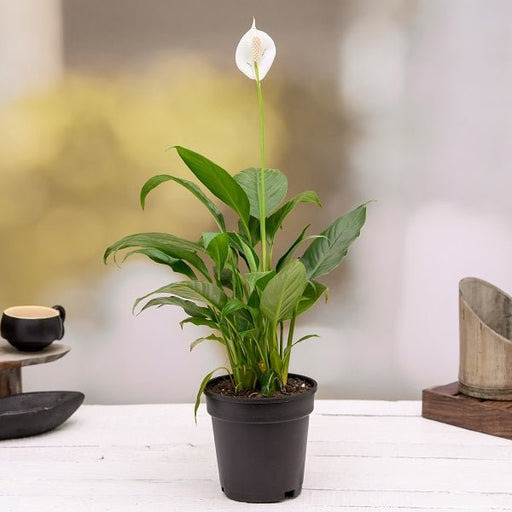 Save up to 15%
Save up to 15%
Peace Lily, Spathiphyllum - Plant The Peace Lily, scientifically known as Spathiphyllum, is a stunning houseplant celebrated for its elegant white...
View full details
 Save 25%
Save 25%
Jasminum sambac, Mogra, Arabian Jasmine - Plant Jasminum sambac, commonly known as Mogra or Arabian Jasmine, is a fragrant flowering plant...
View full details
 Save 18%
Save 18%
Combo Constituents Includes the Parijat Tree (Night-Flowering Jasmine), a culturally significant plant with fragrant flowers. Description The Pari...
View full details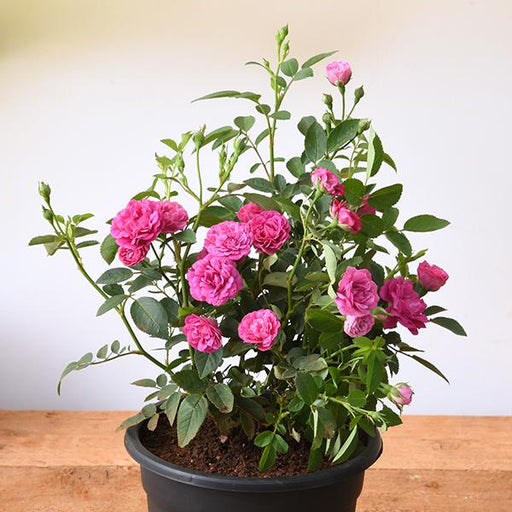
 Save 25%
Save 25%
Miniature Rose, Button Rose (Any Color) - Plant The Miniature Rose, also known as the Button Rose, is a charming and compact flowering plant that ...
View full details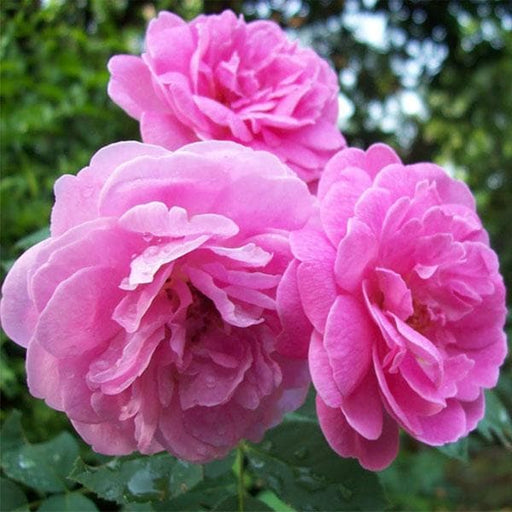 Save 25%
Save 25%
Damascus Rose, Scented Rose (Any Color) - Plant The Damascus Rose, also known as Rosa damascena, is a timeless symbol of beauty and romanc...
View full details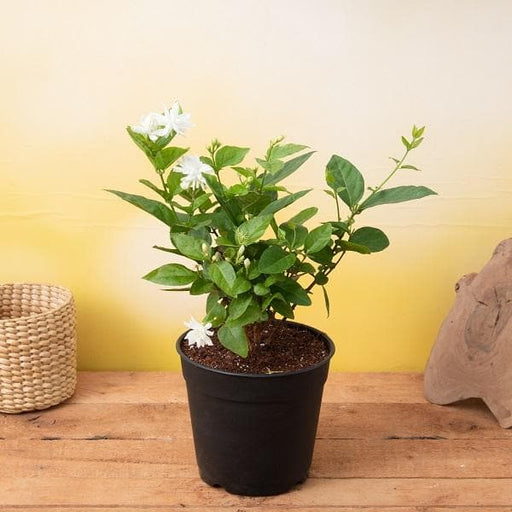
 Save 17%
Save 17%
Beautiful Fragrant Mogra, Arabian Jasmine Plant with Pot The Beautiful Fragrant Mogra, also known as Arabian Jasmine (Jasminum sambac), is...
View full details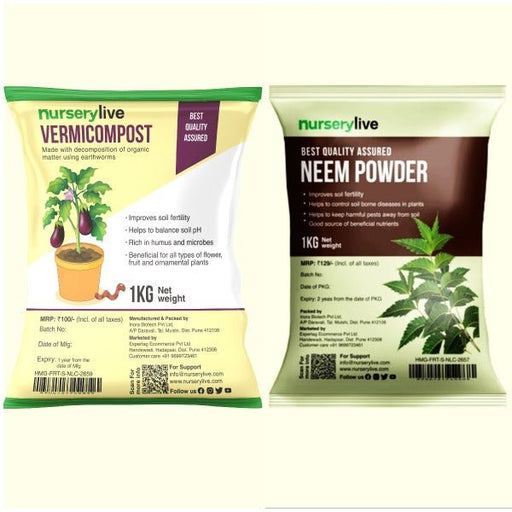 Save 15%
Save 15%
Pack of Vermicompost and Neem Cake for House Plants Transform your indoor garden with our premium Pack of Vermicompost and Neem Cake, spec...
View full details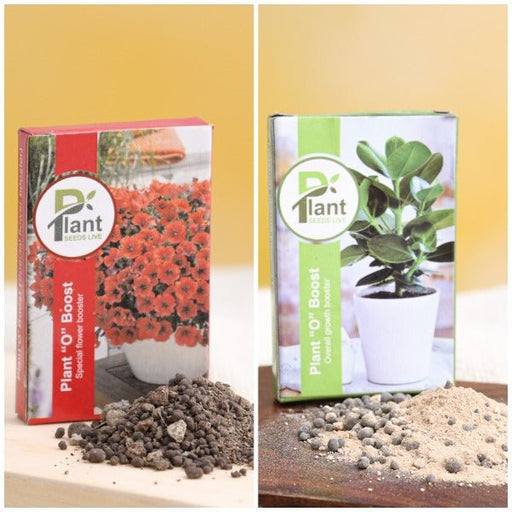
Pack of Plant Growth and Flower Boosters Unlock the full potential of your garden with our Pack of Plant Growth and Flower Boosters! This ...
View full details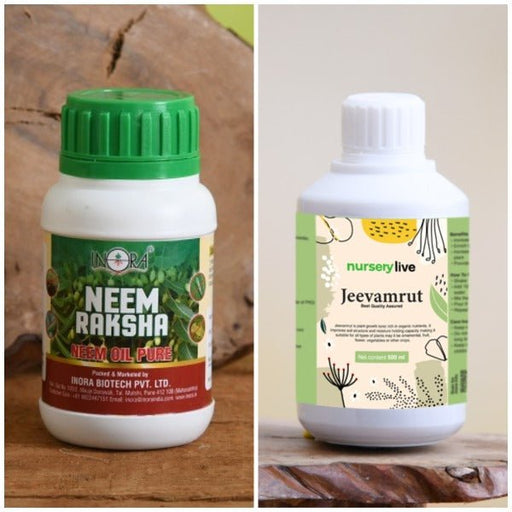 Save 38%
Save 38%
Combo of Jeevamrut and Neem Raksha for Easy Growth and Protection of Houseplants Transform your indoor garden with our exclusive combo of ...
View full details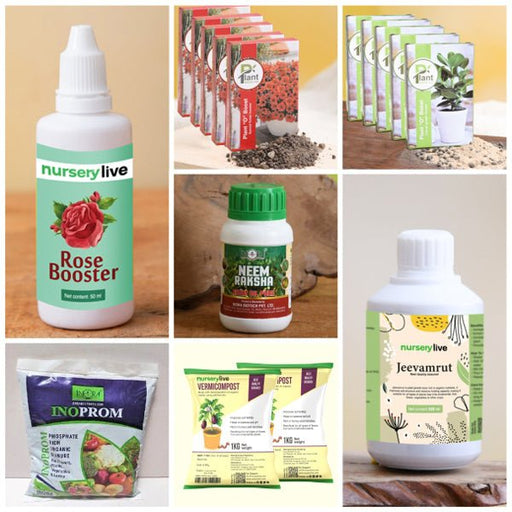 Save 22%
Save 22%
Plant Nutrients Kit (Pack of 16) for a Healthy Garden Transform your garden into a lush paradise with our Plant Nutrients Kit, featuring 1...
View full details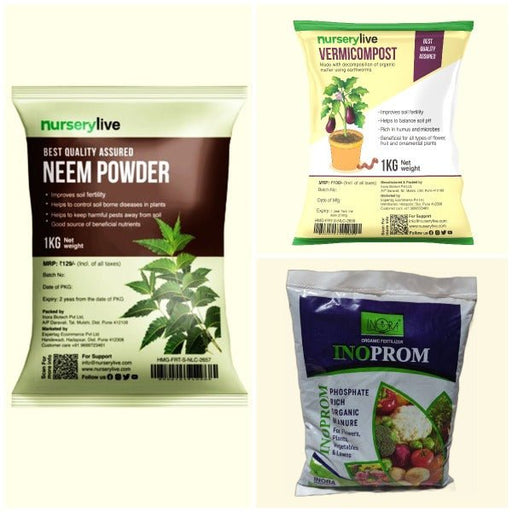 Save 16%
Save 16%
Combo of Top Plant Fertilizers Elevate your gardening game with our exclusive Combo of Top Plant Fertilizers, featuring two bags of premiu...
View full details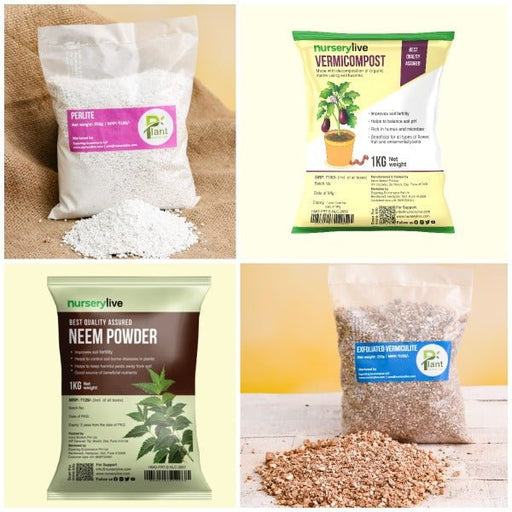 Save 24%
Save 24%
Pack of 4 Additives to Make Soil Healthy and Nutrient Rich Transform your garden into a thriving ecosystem with our Pack of 4 Additives de...
View full details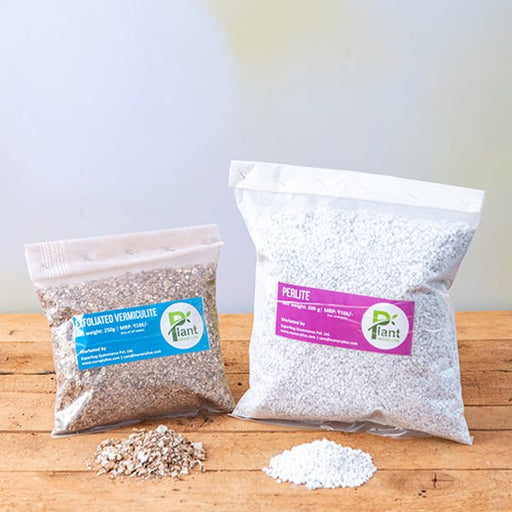 Save 30%
Save 30%
Transform your gardening experience with our premium Combo of Perlite and Vermiculite. This unique blend is designed to enhance soil aeration and ...
View full details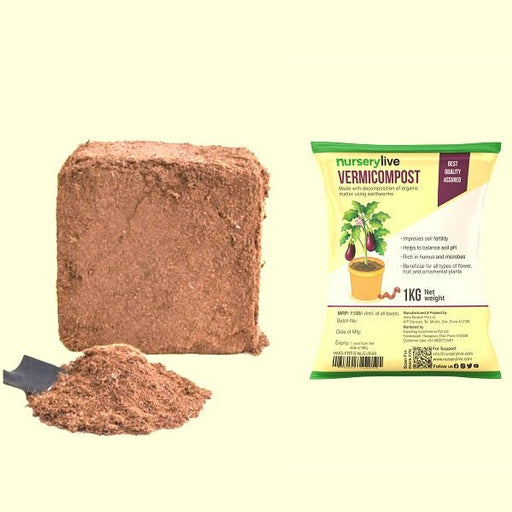 Save 27%
Save 27%
Combo of 2 Vermicompost and Cocopeat - Enrich Your Soil Naturally! Transform your garden into a thriving ecosystem with our Combo of 2 Ver...
View full details
 Save 35%
Save 35%
Best 6 Plants for Perfect Indoor Garden Transform your living space into a lush oasis with our curated collection of the Best 6 Plants for a...
View full details
 Save up to 50%
Save up to 50%
Mini Succulent Garden Pack Transform your space with our Mini Succulent Garden Pack, featuring a delightful collection of 4 any variety beautiful s...
View full details
 Save 30%
Save 30%
5 Best Fragrant Plants Transform your garden or indoor space into a fragrant paradise with our curated selection of the 5 Best Fragrant Plants. Th...
View full details
 Save 24%
Save 24%
Set of 2 Bonsai Looking Grafted Adeniums Transform your indoor or outdoor space with our exquisite Set of 2 Bonsai Looking Grafted Adenium...
View full details Save 45%
Save 45%
Top 4 Die Hard Succulents Pack Transform your indoor or outdoor space with our Top 4 Die Hard Succulents Pack, featuring a curated selecti...
View full details
 Save 30%
Save 30%
5 Best Indoor Plants Pack Transform your living space into a lush oasis with our '5 Best Indoor Plants Pack.' This carefully curated collection fe...
View full details
 Save 25%
Save 25%
Set of 4 Evergreen Air Purifier Plant Pack Transform your indoor space into a lush, green oasis with our Set of 4 Evergreen Air Purifier Pla...
View full details| SrNo | Item Name |
|---|---|
| 1 | Ruscus hypoglossum - Plant |
Ruscus hypoglossum, commonly known as the Butcher's Broom, is a perennial plant native to Europe and parts of Asia. This unique evergreen boasts glossy, dark green leaves that resemble stems, making it an attractive addition to any garden or indoor space. With its ability to thrive in shaded areas, it is perfect for woodland gardens or as ground cover, providing a lush, vibrant look throughout the year.
What makes Ruscus hypoglossum special is its historical significance and medicinal properties. Traditionally used in herbal medicine, it is known for its anti-inflammatory and diuretic effects. Additionally, its unique structure allows it to photosynthesize efficiently, even in low light conditions, making it an eco-friendly choice for sustainable gardening.
This plant's special feature is its ability to produce small, white flowers that bloom in spring, followed by bright red berries in the fall. These berries not only add visual interest but also attract various bird species, enhancing biodiversity in your garden.
If you think caring for Ruscus hypoglossum is like babysitting a cactus, think again! This charming little plant thrives on neglect, making it the perfect companion for those who forget to water their greens. Just give it a cozy spot with indirect sunlight, and it’ll reward you with its glossy leaves and unique charm. Remember, overwatering is the enemy, so channel your inner desert dweller and let the soil dry out between drinks.
Who knew that a plant could be a multitasking marvel? Ruscus hypoglossum isn’t just a pretty face; it’s a natural air purifier, helping to cleanse your indoor air while looking fabulous. Plus, its medicinal properties have been celebrated for centuries, often used in traditional remedies. So, while you’re admiring its beauty, you can also pat yourself on the back for making a health-conscious choice.
Ready to play plant parent? Propagating Ruscus hypoglossum is easier than pie—if pie were made of soil and cuttings! Simply take a healthy stem and place it in a pot with well-draining soil. Keep it warm and moist, and soon you’ll have a mini forest of Ruscus to show off. Just remember, patience is key; good things come to those who wait, especially when it comes to plant babies.
a lush, shady forest floor where Ruscus hypoglossum thrives like a celebrity in a spa. This plant loves its cozy, humid environments, often found in woodlands across Europe. It’s like the introvert of the plant world, preferring to hang out in the shadows rather than basking in the spotlight. So, if you want to recreate its natural habitat, think low light and a touch of humidity—your Ruscus will thank you!
Fear not, plant lovers! Ruscus hypoglossum is as harmless as a kitten in a sunbeam. While some plants come with a warning label, this one is safe for pets and humans alike. So, you can let your furry friends frolic around without worrying about them nibbling on your leafy companion. It’s the perfect plant for those who want greenery without the drama of toxicity.
This plant isn’t just a pretty face; it’s a versatile gem! Ruscus hypoglossum has been used in traditional medicine for its anti-inflammatory properties, making it a go-to for herbal enthusiasts. Plus, its striking appearance makes it a popular choice for floral arrangements and decorative displays. So, whether you’re looking to spice up your home decor or dabble in herbal remedies, Ruscus has got you covered.
If you think Ruscus hypoglossum is a sun worshipper, think again! This plant prefers the gentle caress of indirect light, much like a cat lounging in a sunbeam. Too much direct sunlight can scorch its delicate leaves, so find a cozy spot away from harsh rays. It’s the perfect plant for those who want to add greenery without the risk of a sunburn—both for the plant and yourself!
When it comes to soil, Ruscus hypoglossum is a bit of a diva. It craves well-draining soil that allows its roots to breathe, so think of it as a plant that enjoys a luxurious spa treatment. A mix of potting soil and sand or perlite will do the trick, ensuring it doesn’t sit in soggy conditions. After all, nobody likes wet feet, especially not this fabulous plant!
Pruning Ruscus hypoglossum is like giving your plant a stylish haircut—just the right snip can make all the difference! Regular trimming helps maintain its shape and encourages new growth, so don’t be shy with those shears. Just remember to cut above a leaf node to promote healthy branching. Your Ruscus will thank you with a fresh, vibrant look that’s sure to turn heads.
While Ruscus hypoglossum is generally pest-resistant, it’s not completely immune to the occasional uninvited guest. Keep an eye out for pesky aphids or spider mites, but don’t panic! A gentle wash with soapy water or a neem oil spray will send them packing. Think of it as a plant spa day—refreshing and rejuvenating, minus the cucumber slices.
If you’re looking to add a touch of elegance to your garden, Ruscus hypoglossum is your go-to plant! Its lush foliage and unique structure make it a stunning addition to shaded areas or as a ground cover. Plus, it’s low-maintenance, so you can spend more time sipping lemonade and less time sweating over your garden. It’s the perfect plant for those who want to impress without the hassle!
Just like you change your wardrobe with the seasons, Ruscus hypoglossum needs a little seasonal TLC too! In spring and summer, it’s all about watering and feeding to support its growth. Come fall and winter, dial back the watering and let it rest. Think of it as a plant vacation—time to recharge and prepare for another fabulous growing season. Your Ruscus will come back refreshed and ready to shine!
Ruscus hypoglossum, also known as the butcher's broom, is a charming perennial plant that boasts glossy green leaves and unique, small flowers. It’s not just a pretty face; this plant has a knack for thriving in shady spots, making it the perfect companion for those dimly lit corners of your garden.
Caring for Ruscus hypoglossum is as easy as pie! Just plant it in well-drained soil, water it moderately, and let it bask in partial shade. This plant is low-maintenance, so you can spend more time sipping tea and less time worrying about your greenery.
While Ruscus hypoglossum prefers partial shade, it can tolerate some sun. However, too much sun might make it cranky, leading to scorched leaves. Think of it as a plant that enjoys a good sunbath but prefers a cozy umbrella nearby.
Yes, Ruscus hypoglossum is like the bouncer of the plant world—deer tend to avoid it! Its tough, spiky leaves are not on the menu for these four-legged diners, making it a great choice for gardens in deer-prone areas.
Water Ruscus hypoglossum when the top inch of soil feels dry. It’s a bit of a Goldilocks plant—not too wet, not too dry, but just right! Overwatering can lead to root rot, which is a fate worse than a soggy sandwich.
Ruscus hypoglossum isn’t just a pretty face; it’s also a natural remedy! Traditionally, it’s been used to improve circulation and reduce swelling. So, while it beautifies your garden, it might just help you feel a bit better too!
Absolutely! Propagating Ruscus hypoglossum is as easy as pie. You can do it through division in spring or by taking cuttings. Just remember to give your new plant babies some love and attention, and they’ll thrive like their parent plant.
Good news for pet parents! Ruscus hypoglossum is non-toxic to cats and dogs. So, you can have your plant and let your furry friends roam freely without worrying about them nibbling on your greenery.
Ruscus hypoglossum thrives in well-drained, loamy soil. It’s like a plant with a refined palate—too much clay or sand, and it’ll throw a tantrum. Aim for a balanced mix, and your plant will reward you with lush growth.
Ruscus hypoglossum typically blooms in spring, showcasing its tiny, unassuming flowers. They may not steal the show, but they add a delightful touch to the plant’s overall charm. It’s like the quiet friend who surprises you with their hidden talents!
Ruscus hypoglossum is quite the resilient little trooper! While it prefers consistent moisture, it can tolerate short periods of drought. Just don’t push your luck—too much neglect, and it might sulk like a child denied dessert.
You can find Ruscus hypoglossum at local nurseries, garden centers, or online plant retailers. Just make sure to check the plant’s health before bringing it home. After all, you want a vibrant companion, not a wilting wallflower!